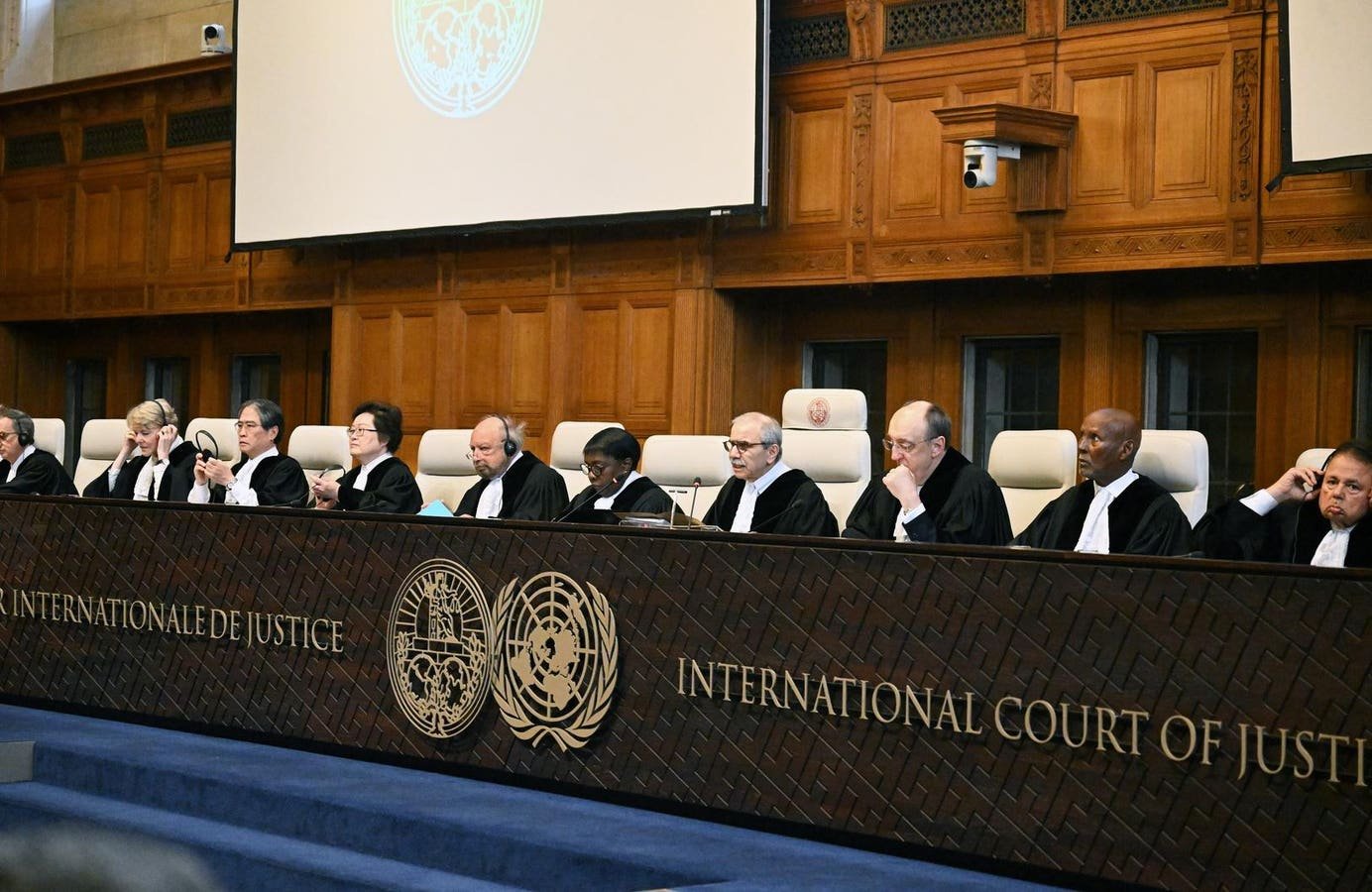THE HAGUE, NETHERLANDS – APRIL 09: A general view of the hall in a public hearing at the … [+] International Court of Justice (ICJ) in The Hague, the Netherlands on April 09, 2024. T (Photo by Dursun Aydemir/Anadolu via Getty Images)
The International Court of Justice has released the detailed schedule for oral arguments in its advisory opinion on the Obligations of States in respect of Climate Change. The hearings will begin on Monday, December 2, with over 100 countries and organizations presenting in 30 minute increments over two weeks. At the request of the United Nations General Assembly, the ICJ will determine the existing financial liability of countries for their contribution to climate change and what actions countries must take to prevent climate change. The advisory opinion, while non-binding, could set a new standard for climate litigation.
On March 29, 2023, at the request of Vanuatu, the UNGA asked the ICJ to issue an advisory opinion on the legal obligations of countries in preventing climate change. The opinion, while non-binding, will give an indicator of how the Court may interpret future climate related litigation and guide future legislative development.
The UNGA asked a two questions:
“What are the obligations of States under international law to ensure the protection of the climate system and other parts of the environment from anthropogenic emissions of greenhouse gases for States and for present and future generations”?
“What are the legal consequences under these obligations for States where they, by their acts and omissions, have caused significant harm to the climate system and other parts of the environment, with respect to: (i) States, including, in particular, small island developing States, which due to their geographical circumstances and level of development, are injured or specially affected by or are particularly vulnerable to the adverse effects of climate change? (ii) Peoples and individuals of the present and future generations affected by the adverse effects of climate change?”
The UN sent an initial package of relevant laws and treaties. The Court determined that members states and international organizations should also given the opportunity to weigh in on their legal arguments and opinions through written statements. At the conclusion of the timeline for written statements and responses, the court set oral arguments to begin on December 2.
The public hearings will occur at the International Court of Justice in The Hague, Netherlands. On October 15, parties participating in oral arguments were sent a schedule. That schedule was made public on November 8.
Ninety-eight states and twelve international organizations will participate in the public hearings. The oral presentation schedule is nearly in alphabetical order, with some exceptions.
The hearings will open on Monday, December 2nd at 10am CEST. At 10:15, Vanuatu and Melanesian Spearhead Group will be given an hour to, in essence, make an opening argument. All other parties are given 30 minutes to make their arguments.
The daily breakdown is as follows (in chronological order):
Monday, December 2: South Africa, Albania, Germany, Antigua and Barbuda, Saudi Arabia, Australia, Bahamas, Bangladesh, and Barbados.
December 3: Belize, Bolivia, Brazil, Burkina Faso, Cameroon, Philippines, Canada, Chile, China, Colombia, Commonwealth of Dominica, and Korea (Republic of).
December 4: Costa Rica; Côte d’Ivoire; Denmark, Finland, Iceland, Norway and Sweden (jointly); Egypt; El Salvador; United Arab Emirates; Ecuador; Spain; United States; Russian Federation; and Fiji.
December 5: France, Gambia, Ghana, Grenada, Guatemala, Cook Islands, Marshall Islands, Solomon Islands, India, Iran (Islamic Republic of), and Indonesia.
December 6: Jamaica, Papua New Guinea, Kenya, Kiribati, Kuwait, Latvia, Liechtenstein, Malawi, Maldives, and the African Union.
Monday, December 9: Mauritius, Mexico, Micronesia (Federated States of), Myanmar, Namibia, Japan, Nauru, Nepal, New Zealand, Palestine (State of), and Pakistan.
December 10: Palau, Panama, Netherlands, Peru, Democratic Republic of Congo, Portugal, Dominican Republic, Romania, United Kingdom, and Saint Lucia.
December 11: Saint Vincent and the Grenadines, Samoa, Senegal, Seychelles, Sierra Leone, Singapore, Slovenia, Sudan, Sri Lanka, Switzerland, and Serbia.
December 12: Syria, Thailand, Timor-Leste, Tongo, Tuvalu, Comoros (Union of), Uruquay, Viet Nam, Zambia, Pacific Islands Forum Fisheries Agency, and Alliance of Small Island States.
December 13: Commission of Small Island States on Climate Change and International Law; Pacific Community; Pacific Islands Forum; Organisation of African, Caribbean and Pacific States; Organization of the Petroleum Exporting Countries (OPEC); World Health Organization (WHO); European Union; International Union for Conservation of Nature.
While the hearings are open to the public, due to the large number of participating parties and the small size of the Great Hall of Justice at the Peace Palace in The Hague, seating will be limited. Only five seats will be made available to the public on a first come, first serve basis. The hearings will be streamed on the Court’s website.
